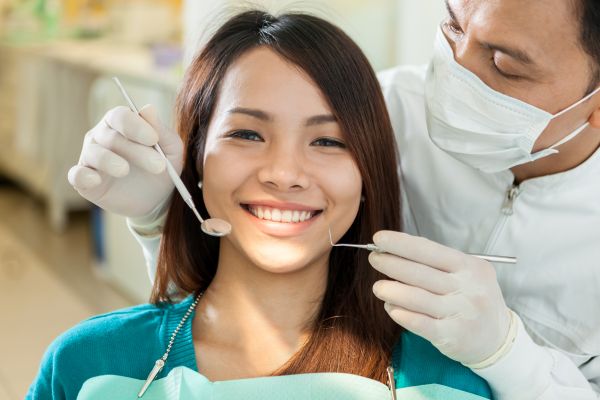3 Questions To Ask Your Dentist During Oral Exams

The American Dental Association recommends that people visit their dentist twice yearly for oral exams, cleaning, and x-rays. The dental visits offer patients a chance to ask questions about their oral health or any concerns they have about pending dental procedures.
When preparing for such appointments, it is better to make a list of the questions, so you do not forget anything while in the dental office. Also, patients can reach out to the dental office after leaving if they have additional questions.
Questions to ask during an oral examination
The following are possible questions patients can ask during a routine dental appointment:
How do I improve my oral health?
Each person has a unique oral cavity, which means the general rule of brushing and flossing twice daily may not always apply. Dentists can make personalized recommendations after an exam. They can advise patients to brush more often, change their toothbrush or even teach them how to floss properly. Dentists can tell if a patient needs to increase or decrease their fluoride use, or if they need to come in more regularly for dental checkups.
It is advisable to also ask the dentist about a particular dental product to determine if it would be helpful or if it may be an outright waste of money. Dentists are usually familiar with many dental products and will be able to make a recommendation.
Am I at the risk of future dental issues?
Some people are more prone to dental issues than others are and it is a good idea to ask your dentist about this during an oral exam. This could be due to poor oral hygiene routines, hereditary factors, and harmful oral habits such as nail biting, ice chewing, teeth grinding, or smoking.
It can be helpful to know if someone is at a higher risk of certain dental issues so they can take proactive measures to avoid those problems. Patients can also ask their dentist about any minor conditions to monitor before the next dental appointment and what they can do to stop the issue from worsening.
What measures can I take to make my teeth stronger?
Some dental and fluoride treatments can help to enhance the strength and durability of the teeth. Dentists offer some of the treatments and can advise their patients accordingly, depending on what they want to achieve. Younger patients can benefit from fluoride treatment to remineralize their enamel. The procedure could also be useful for adults with weak teeth that are vulnerable to cavities. Some patients may also benefit from getting dental crowns or veneers to make their teeth stronger, depending on the severity of the damage.
Final note
Although biannual visits to the dentist are enough for most people, you also need to monitor and take care of your oral cavity daily. Keeping the teeth and gums healthy can save you from pain and expensive dental procedures. Ensure you ask your dentist about any concerns you have and get advice on how best to take care of your oral health. Visiting the dentist regularly for oral exams will also ensure minor issues are detected early before they turn into severe problems.
Request an appointment here: https://totalcaredentalchicago.com or call Total Care Dental at (773) 786-9586 for an appointment in our Chicago office.
Check out what others are saying about our services on Yelp: Read our Yelp reviews.
Related Posts
Gum disease treatment can restore health to the smile. A family dentist — who often provides cosmetic services in addition to general dental care — offers targeted solutions based on the severity and progression of gum disease. Early detection and prompt intervention can halt or reverse the condition. Exploring how family dentists treat gum disease…
All-on-X implants offer a stable and natural-looking solution for individuals with multiple missing teeth. For those considering or already living with All-on-X implants, proper care is essential to protect the investment and maintain long-term oral health. With the right routine and professional support, All-on-X implants can deliver years of confident smiles and comfortable function.Cleaning All-on-X…
Choosing a kid-friendly dentist can make for a positive and comfortable start to a child’s oral health journey. A welcoming environment, experienced team, and tailored approach help make early dental visits feel relaxed and reassuring. The goal is to build trust so that children feel comfortable and even excited about oral health, which can lead…
For many people who feel nervous about dental care, laser dentistry offers a calmer, gentler path to treatment. The technology utilizes focused light to treat teeth and gums with reduced noise and vibration compared to traditional tools. This quieter experience helps reduce tension in the chair and can lower the need for numbing in select…

